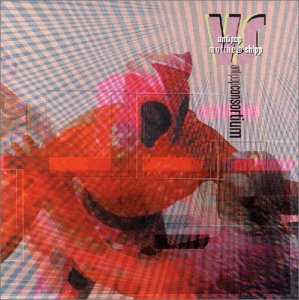Antipop Consortium – Antipop vs. Matthew Shipp Thirsty Ear THI57120.2 (2003)
As one of the smartest and most talented musical groups of their day, Antipop Consortium broke away from the self-imposed restraints of hip-hop on their last full-length album. Antipop made a stand for music as music, with no fixed forms or techniques. They explored something more jazz than hip-hop and more hip-hop than jazz, maybe best termed hiprovisation or something of that sort. Antipop vs. Matthew Shipp may be highbrow, but, adopting Matthew Shipp‘s “jazz as boxing” concept, it is a well-executed confrontation of the forces shaping the future of hip-hop (and jazz). This fluid and engaging album is easy on the ears.
Antipop Consortium’s debut Tragic Epilogue showed a lot of promise that they have certainly made good on in following years. They did manage to incorporate electronic styling into hip-hop on their superb Arrhythmia. The British IDM (so-called “intelligent dance music”) scene seemed an ironic place for a new school (new wave?) hip-hop troupe like the Antipop Consortium to fight hip-hop’s stagnation, but it seems to have helped them incorporate improvisation into their vision of hip-hop. Antipop vs. Matthew Shipp is the final album from the Antipop trio of High Priest, Beans and M. Sayyid as they each pursue solo efforts. Apparently the group actually fell apart quite literally during the recording process, with Beans coming through to finish off the last tracks with Shipp after Sayyid and Priest departed. Though the breakup marks the end of a great group, they accomplished a lot in their brief existence.
Antipop vs. Matthew Shipp explores the interface between the toxic recontexualization of hip-hop and the individual expressionism afforded by improvisation. It is a program of continual redefinition for the individual performers as well as for the group dynamic. From hip-hop, they show a reorganization of musical elements lain out by circumstance. From improvisation, they develop transparency in the process. The developing interface allows spontaneous selection of what from the past might still be valid in the present.
The ambitions of this album get the better of Antipop at times. But these few errors are but part of a bigger success. Spontaneity breaks the typical rhythmic time constraints of hip-hop. Antipop’s control is not yet complete, but the day when the total clarity of vision they contemplate appears to be fast approaching. They propose new attacks and counterattacks with fluid succession, and their lackadaisical raps add a random factor that codifies the interface of hip-hop and jazz. Antipop’s mere presence on this interface is itself a statement of defiance and creation.
One extraordinary quality of Antipop vs. Matthew Shipp is the spectacular lyricism. Antipop have that down. “Coda” goes: “You used to/ move like the breath of truth/ you used to . . . Your eyes/ just like mine . . . Suddenly, death/ something inside of me is gone/ Antigone how did we end up like this?”
Matthew Shipp’s crew brings an array of skills to bear. They send jabs and hooks at Antipop where the result can emerge from the flow of the fight. “Staph” makes full use of Guillermo E. Brown‘s powerful, shifting rhythmic sense to bolster Antipop’s lyrical platform. Brown’s lyrical and textural drumming colors the sound enough to keep the structure from ever sounding like a limitation. His style is certainly an outgrowth of the Max Roach school of thought. “A Knot In Your Bop” takes the rhythmic textures to their highest point of the album, as fuzzy rides on the cymbal contend with dark, pounding chords from the piano. Later, “Monstro City” puts the synchronous rhythms of Brown and bassist William Parker front-and-center to keep the album moving forward (at what seems to be 9/8 time).
“Staph” is a standout because Antipop never do too much. Their restraint is important. They know when to stop. As such, the album concludes with “Free Hop” reaffirming the Shipp crew’s input.
There is still plenty of room to diversify, which makes this a vital release in the continuing discovery of how man relates to his world. Antipop know that 4 = 4, but they also know that 3 x 3 – 5 = 4. Inputs from Shipp’s crew make the mathematics suitably meaningful, making the album a revelation. Antipop understand the complexity of the equation and the alternative ways of reaching its incontrovertible balance. They can envision arriving at that equal sign by more significant than swift measures.

